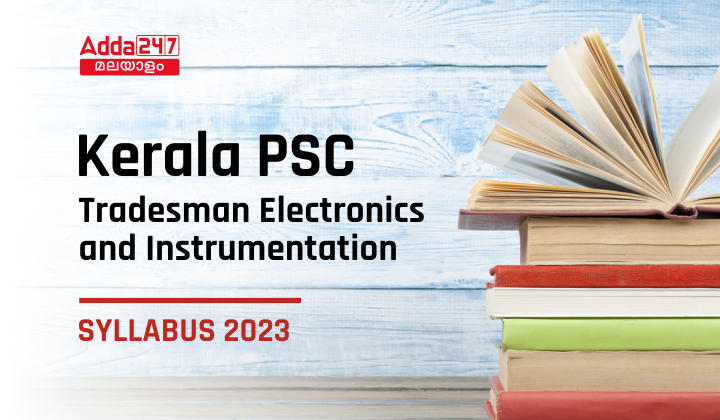Table of Contents
Kerala PSC Tradesman Electronics and Instrumentation Syllabus 2023: Kerala Public Service Commission has published Tradesman Electronics and Instrumentation Exam Syllabus. If you have applied for the post of Tradesman Electronics and Instrumentation and would like to know the detailed syllabus, then your search ends right here. In this article we will provide the detailed syllabus of the upcoming Tradesman Electronics and Instrumentation Exam 2023. In order to crack the exam, one needs to have a clear understanding of the syllabus, therefore read through Electronics and Instrumentation Tradesman PSC Syllabus to broaden your perspective. You can also download Tradesman Electronics and Instrumentation Kerala PSC Syllabus in pdf format.
Kerala PSC Tradesman Electronics and Instrumentation Syllabus 2023
Kerala PSC Tradesman Electronics and Instrumentation Exam Syllabus: പരീക്ഷയ്ക്കുള്ള തയ്യാറെടുപ്പുകൾ ആരംഭിക്കാൻ സമയമായി. പരീക്ഷയിൽ വിജയിക്കുന്നതിന്, സിലബസിനെക്കുറിച്ച് വ്യക്തമായ ധാരണ ഉണ്ടായിരിക്കണം, അതിനാൽ കേരള PSC ട്രേഡ്സ്മാൻ ഇലക്ട്രോണിക്സ് ആൻഡ് ഇൻസ്ട്രുമെന്റേഷൻ സിലബസ് 2023 വിശദമായി വായിച്ച് മനസിലാക്കുക. നിങ്ങൾക്ക് Tradesman Electronics and Instrumentation Technical Education Syllabus Pdf രൂപത്തിൽ ഡൗൺലോഡ് ചെയ്യാവുന്നതാണ്.
Tradesman Electronics and Instrumentation Exam Syllabus: Overview
ചുവടെ നൽകിയിരിക്കുന്ന പട്ടികയിൽ Kerala PSC Tradesman Electronics and Instrumentation Exam Syllabus സംബന്ധമായ എല്ലാ പ്രധാനപ്പെട്ട വിവരങ്ങളും ലഭിക്കും.
| Kerala PSC Tradesman Electronics and Instrumentation Exam Syllabus | |
| Organization | Kerala Public Service Commission |
| Category | Exam Syllabus |
| Department | Technical Education Department |
| Name of the Post | Tradesman Electronics and Instrumentation |
| Category No. | 766/2021 |
| Last Date to Submit Confirmation | 23rd March to 11th April 2023 |
| Mode of Examination | ONLINE/ OMR |
| Medium of Questions | English |
| Total Marks | 100 |
| Duration of Examination | 1 Hour 30 Minutes |
| Official Website | www.keralapsc.gov.in |
Fill the Form and Get all The Latest Job Alerts – Click here
Kerala PSC Tradesman Electronics and Instrumentation Exam Pattern
| Kerala PSC Tradesman Electronics and Instrumentation Exam Pattern 2023 | ||
| Modules | Topics | Marks |
| Module I | Measurement Systems and characteristics of Instruments | 20 Marks |
| Module II | Basics of Electrical Engineering | 10 Marks |
| Module III | Basics of Electronics Engineering | 12 Marks |
| Module IV | Fundamentals of Digital Electronics & microcontrollers | 06 Marks |
| Module V | Power sources and Renewable energy systems | 05 Marks |
| Module VI | Basics of Computer Hardware and Software | 10 Marks |
| Module VII | Basics of indicating Instruments | 04 Marks |
| Module VIII | Basics of Transducers and Instrumentation | 20 Marks |
| Module IX | Data Acquisition and Telemetry | 05 Marks |
| Module X | Basics of Biomedical, Control system and Process control | 08 Marks |
| Total | 100 Marks | |
Tradesman Electronics and Instrumentation Syllabus: Download PDF
Tradesman Electronics and Instrumentation Exam Syllabus PDF ഡൗൺലോഡ് ചെയ്യാൻ, താഴെ നൽകിയിരിക്കുന്ന ലിങ്കിൽ ക്ലിക്ക് ചെയ്യുക.
Kerala PSC Tradesman Electronics and Instrumentation Syllabus 2023 PDF Download
Tradesman Electronics and Instrumentation Kerala PSC Syllabus 2023 Detailed
Module 1 – Measurement Systems and characteristics of Instruments (20marks)
a. Measurement methods, Essential elements of Instruments, Classification of Instruments, Functions of Instruments and measurement systems, Applications of measurement systems, Elements of generalized measurement system.
b. Static characteristics Accuracy, Precision, sensitivity, Resolution, threshold, Dead zone, Repeatability, Reproducibility, Drift, Error, Scale Range, Span, Linearity and Hysteresis.
c. Dynamic characteristics, Speed of response, Dynamic error, Fidelity, measuring Lag
d. Limiting Errors, Relative limiting error, Gross error, Systematic error and Random error
e. Units, Systems and Dimensions – Absolute units, fundamental and derived units, Dimensions of mechanical units, practical units, Base units, Derived units, Absolute units, standards and classifications
f. Analog instruments, classifications, Operating forces of Electromechanical indicating instruments, Types of Damping
Module 2 – Basics of Electrical Engineering (10 marks)
a. Resistance, Resistivity, Conductivity, Ohm’s Law, Resistance in series and Parallel, Electric charges, Potential difference, Voltage, Current, Resistance. Basics of AC & DC, Frequency, Time period, RMS, Peak, Instantaneous value. Single phase and Three phase supply. Terms like Line and Phase voltage/ currents.
b. Absolute and Relative permittivity of medium, Electric Field, Field density, Potential and potential difference
c. Capacitance, Parallel plate capacitor, Capacitors in series and parallel, Dielectric constant, charging and discharging of capacitor
d. Magnetism and Electromagnetism, Absolute and relative permeability, Field intensity, Magnetic Potential, Flux and Flux density, Comparison between Magnetic and Electric circuits, Electromagnetic induction, Faraday’s Laws, Self-inductance, Coefficient of self-inductance, Mutual inductance, Coefficient of Mutual inductance, Coefficient of coupling.
e. Insulators, conductors and semiconductors, Active and Passive Components, Resistors; types of resistors, their construction & specific use, color-coding, power rating. Equivalent Resistance of series parallel circuits. Distribution of Volage and current in series / parallel circuits. Principles of induction, inductive reactance. Concept of Resonance – RC, RL & RLC series and parallel circuit.
Module 3 – Basics of Electronics Engineering (12 marks)
a. PN Junction diode: Intrinsic and extrinsic semiconductors, Principle of operation, V-I characteristics, principle of working of Zener diode, Photo diode, Rectifiers, Filters, varactor diode
b. Transistor, Construction, working of a PNP and NPN Transistors, purpose of Emitter, base and collector Terminals. Significance of α and β. Need for
Biasing of Transistor. Different Voltages and Currents, Junction Temperature, junction capacitance, frequency of operation. Transistor applications as switch and amplifier. Transistor input and output characteristics. Transistor power ratings & packaging styles and use of
different heat sinks
c. Amplifiers, Classification of amplifiers, Voltage amplifiers – voltage gain, Single stage CE amplifier, Emitter follower circuit and its advantages. RC
coupled amplifier.
d. UJT, FET, MOSFET, DIAC, TRIC, SCR, IGBT symbols and circuits of FET Amplifier, SCR using UJT triggering, snubber circuit, light dimmer circuit
using TRIAC, UJT based free running oscillator.
Module 4 – Fundamentals of Digital Electronics & microcontrollers (6 Marks)
a. Number Systems – Decimal, Binary, Octal, Hexadecimal, conversions, 1‘s and 2‘s complements, Codes – Binary, BCD, Excess 3, Gray, Alphanumeric
codes, Boolean theorems, Logic gates, Universal gates, Sum of products and product of sums, Half Adder, Full adder.
b. Microcontroller fundamentals – Memory organization, Addressing modes, Registers, Interrupts.
Module 5 – Power sources and Renewable energy systems (5 marks)
a. SMPS, Switch mode power supplies and their working principles. Various types of chopper circuits
b. Inverter, principle of operation, power rating, change over period.
c. UPS, Concept of Uninterrupted power supply. Types of UPS: Off line UPS, On line UPS, Line interactive UPS & their comparison, UPS specifications.
d. Solar Power, Need for renewable energy sources, Solar energy as a renewable resource. Materials used for solar cells. Principles of conversion of solar light into electricity. Basics of photovoltaic cell. Module, panel andArrays. Factors that influence the output of a PV module
Module 6 – Basics of Computer Hardware and Software (10 Marks)
a. Types of Computers – Micro, Mini, Mainframe and Super Computer, Architecture of a Computer System–Processor (CPU) – Types and their specifications (Intel: Celeron, P4 family, Xeon, dual core, quad core, core 2 duo, i3, i5, i7 and AMD), ALU, Memory – Types, Storage, Semiconductor memories: RAM, ROM, PROM, EMPROM, EEPROM, Static and Dynamic, Cache Memory, Secondary Storage Devices -Types, Capacity, Standards, Interface.
b. Concept of Operating System–Types of Operating Systems, Functions of an Operating System, Need of OS, Batch Processing, Multi-processing, Single
user & Multi user OS, Introduction to Unix, Linux, Windows systems.
c. Introduction to Computer Networks – Definition, Advantages, Architecture: Peer-to-Peer and Client/Server Network. Network Topologies – Star, Ring, Bus, Tree, Mesh, Hybrid. Types of Networks – Local Area Network (LAN), Metropolitan Area Network (MAN), Wide Area Network (WAN), Intranet and Internet. Wi-Fi, Bluetooth.
Module 7 – Basics of indicating Instruments (4 marks)
a. Fundamentals of analog Ammeters, Voltmeters and Galvanometers, Measurement of Power and Energy, Measurement of Resistance, Potentiometers, Multi meters and Cathode Ray Oscilloscopes.
Module 8 – Basics of Transducers and Instrumentation (20 marks)
a. Transducers, Classification of Transducers, Resistive Transducers, Sensitivity, Types of Potentiometers, Strain Gauges, Gauge factor, Piezoresistive effect, Types of strain gauges,
b. Resistance Temperature detectors, Thermistors and Thermocouple, Seebeck effect, Peltier effect
c. Variable inductance transducers, LVDT, Capacitive transducers, types, uses.
d. Piezo-electric transducers, Hall effect transducers, Tachometers, Stroboscope
e. Measurement of displacement, Types, Load cells, Measurement of Pressure, Types of instruments, Measurement of Torque, measurement of Vibration and acceleration.
f. Density, Viscosity and PH measurements, Conductivity meter, Calorimeter, Gas analyser
g. Photo-electric transducers, Bolometer, Thermopile, Pyrometers
h. Measurement of Flow, Turbine, Electromagnetic and ultrasound flowmeter, different types of Liquid Level measurement.
i. Types of Radiation, Geiger muller counter, Ionization Chamber, Scintillation counter.
Module 9 – Data Acquisition and Telemetry (5 Marks)
a. Components of Data Acquisition system, Multiplexing, Recorders and Data Logging, General Telemetry system, Types, Voltage Telemetry, Current
Telemetry, Position Telemetry, Radio frequency Telemetry, Transmitters
b. Fibre optic communication: – Introduction to optical fibre, optical connection and various types, its advantages, properties of optic fibre,
testing, losses, types of fibre optic cables and specifications.
Module 10 – Basics of Biomedical, Control system and Process control (8 marks)
a. Open loop and closed loop control system, Transfer function, Gain, Bandwidth, Stability, Order of system, Force-voltage analogy, Laplace Transformation, Transient response.
b. Automatic control, variables, process, Feedforward control, Offset, ON-OFF control, PID controller, PLC fundamentals, PLC Block diagram, Ladder Diagram, Pneumatic and Hydraulic controller, I/P and P/I converters, Final control elements, DCS & SCADA
c. Bio electric potentials, ECG, The Sino-atrial node, Oximeter, Blood pressure measurements. Blood flow measurements, Biosensors
| RELATED ARTICLES | |
| Kerala PSC Tradesman Diesel Mechanic Syllabus | Kerala PSC Tradesman (IT) Syllabus 2023 |
| Kerala PSC Tradesman (Wireman) Syllabus 2023 | |




